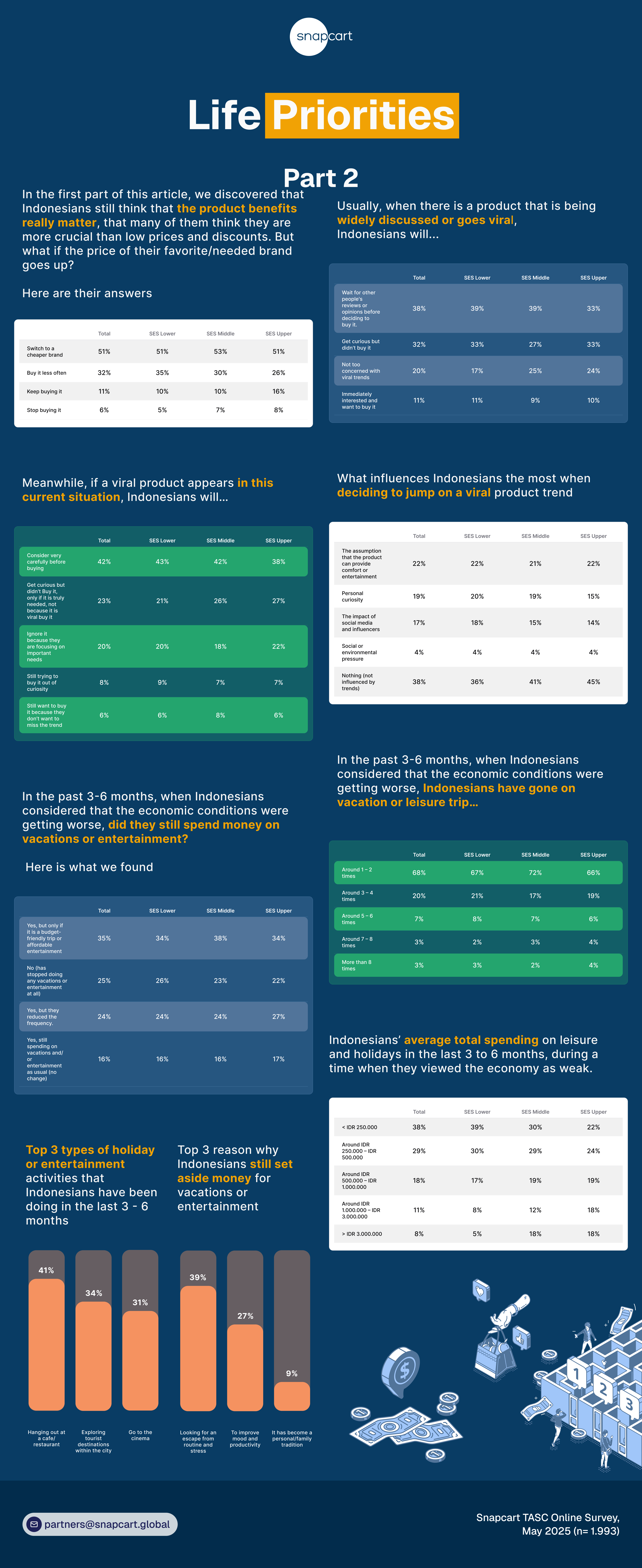As Indonesia navigates through economic uncertainty, consumers are increasingly becoming more strategic and mindful about how they spend their money.
Interestingly, in the first part of this post, we found a fascinating shift in Indonesian consumers’ mindset that prioritizes meaningful experiences, emotional well-being, and product value in the current economic situation [1] .
However, how about their spending habits, especially in the face of rising prices, viral product trends, and lifestyle-related expenses?
Check out our study results in this article and find out Indonesians’ behaviour over impulsive or trend-driven purchases in this economy.

Product Value Still Reigns Supreme
One of the most striking insights from this survey is that Indonesians still put product benefits above all else, including low prices. Even when their favorite or most-needed brand increases in price, more than half (51%) say they would switch to a cheaper alternative. However, this doesn’t mean they blindly chase discounts. 32% prefer to reduce the frequency of purchase rather than abandon the product altogether, suggesting a continued loyalty rooted in perceived quality and necessity.
Interestingly, 11% say they would keep buying the product regardless of the price change, demonstrating a strong brand affinity. Only a minority of 6% would stop buying it altogether. These findings suggest that brands offering consistent, high-quality benefits still hold considerable influence over consumers, even during times of financial strain.
Reaction to Viral Products
When it comes to viral or heavily discussed products, Indonesians display cautious curiosity rather than impulse. This study shows that 38% prefer to wait for reviews or other people’s opinions before purchasing. 32% feel intrigued but stop short of buying, while 20% are indifferent to such trends. Only 11% show immediate interest and are willing to buy the product right away.
In this economy, Indonesian consumers are even more discerning. 42% would think very carefully before buying a viral product. 23% admit they would only consider buying it if it’s truly necessary. 20% would ignore the product altogether because their focus is on more urgent financial needs. This trend underscores how practicality is overtaking impulsiveness in purchase decisions, even in the realm of popular and trendy items.
Furthermore, while viral products dominate social media feeds, Indonesian consumers remain selective about what they actually buy. This research reveals that 22% are driven by the belief that a viral product can offer comfort or entertainment. 19% follow trends out of personal curiosity, and 17% are influenced by the opinions of influencers or their online communities.
However, a significant 38% say they are not influenced by any trend, highlighting a growing independence in consumer behavior. This independence may be attributed to an increased awareness of marketing strategies, better access to product information, and a more budget-conscious approach in tough economic times.
Leisure and Entertainment Still Matter – Even in Tough Times
Despite feeling the pinch economically, many Indonesians still prioritize spending on vacations, entertainment, and leisure—albeit in a more calculated manner. Over the past 3–6 months, 35% continued spending on such activities as long as it remained affordable. Meanwhile, 25% stopped spending on vacations or entertainment altogether, and 24% reduced the frequency of their outings. A surprisingly resilient 16% said their spending habits in this area remained unchanged.
In terms of trip frequency, the majority (68%) reported traveling 1–2 times in the last few months. 20% went on 3–4 trips, 7% managed 5–6 trips, and smaller groups took more frequent holidays—with 2% reporting 7–8 trips and 3% traveling more than eight times during that period. These numbers suggest that even in the face of a perceived economic downturn, Indonesians are still finding ways to make room for rest and recreation.
Nevertheless, there are still many people who cut their budget for a long-distance holiday trip in the current economic condition [1]. Hence, when it comes to the types of activities Indonesians are enjoying at present, 41% of respondents said they enjoy hanging out at cafés or restaurants. 34% like exploring destinations within the city—suggesting a preference for nearby, budget-friendly trips. Meanwhile, 31% reported going to the cinema as a go-to form of entertainment. These habits reflect a shift toward localized, everyday experiences that offer joy without demanding large expenditures.
Furthermore, spending data supports the idea that leisure remains a priority, even if the budget is tighter. 38% of respondents spent less than IDR 250,000, while 29% spent between IDR 250,000–500,000. 18% allocated IDR 500,000–1,000,000 to leisure, 11% spent between IDR 1,000,000–3,000,000, and 8% spent more than IDR 3,000,000 on leisure and holiday activities. This range indicates that while many Indonesians are cautious, they are not cutting entertainment and relaxation entirely out of their lives.
Additionally, we also discover that Indonesians don’t just spend on entertainment for the sake of it. The top motivation—reported by 39%—is the need to escape from stress and daily pressures. 27% say they do it to improve mood and productivity, and 9% do so because it’s a family or personal tradition. These findings emphasize that leisure spending is tied not only to fun but also to emotional and psychological well-being, making it a non-negotiable part of life for many.
This research shows a nuanced, balanced perspective on spending among Indonesian consumers. People are still focused on value, experience, and well-being—even in the face of financial uncertainty. From preferring high-benefit products to carefully selecting which trends to follow, and from spending wisely on leisure to maintaining mental health through small joys, Indonesians demonstrate that life priorities are not just about saving money—but spending it wisely.
For more information about this article, contact liza.amelia@snapcart.global or haifa.chairunisa@snapcart.global.
Need to find out more about consumers’ behaviour? Reach us at partners@snapcart.global.
Source:





